高一必修一第一次月考英语试卷
高一第一次月考英语试卷
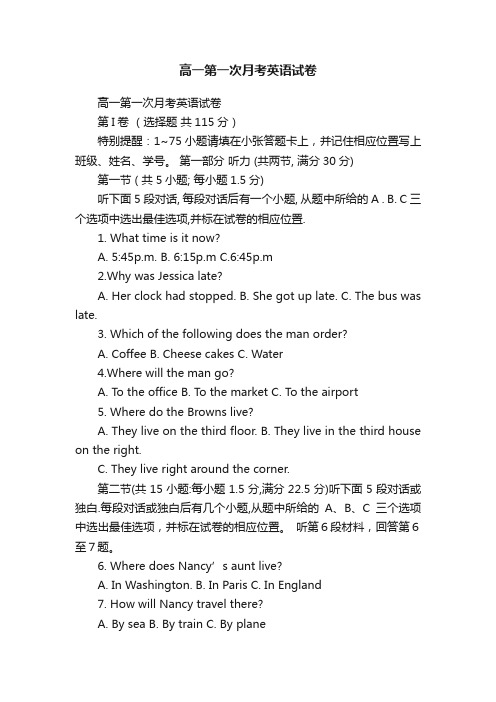
高一第一次月考英语试卷高一第一次月考英语试卷第I卷(选择题共115分)特别提醒:1~75小题请填在小张答题卡上,并记住相应位置写上班级、姓名、学号。
第一部分听力 (共两节, 满分30分)第一节 ( 共5小题; 每小题1.5分)听下面5段对话, 每段对话后有一个小题, 从题中所给的A . B. C 三个选项中选出最佳选项,并标在试卷的相应位置.1. What time is it now?A. 5:45p.m.B. 6:15p.mC.6:45p.m2.Why was Jessica late?A. Her clock had stopped.B. She got up late.C. The bus was late.3. Which of the following does the man order?A. CoffeeB. Cheese cakesC. Water4.Where will the man go?A. To the officeB. T o the marketC. To the airport5. Where do the Browns live?A. They live on the third floor.B. They live in the third house on the right.C. They live right around the corner.第二节(共15小题:每小题1.5分,满分22.5分)听下面5段对话或独白.每段对话或独白后有几个小题,从题中所给的A、B、C三个选项中选出最佳选项,并标在试卷的相应位置。
听第6段材料,回答第6至7题。
6. Where does Nancy’s aunt live?A. In Washington.B. In ParisC. In England7. How will Nancy travel there?A. By seaB. By trainC. By plane听第7段材料,回答第8至10题。
人教英语必修一高一第一次月考

高一第一次月考英语试卷1.本试卷分第一卷(选择题)和第二卷(非选择题)两部分,共150分;考试时间120分钟。
2.本试卷各试题答案必须在答题纸上规定的答题区域内作答,否则无效。
第一卷第一部分听力(共两节,满分30分)第一节(共5小题;每小题1.5分,满分7.5分)听下面5段对话。
每段对话后有一个小题,从题中所给的A、B、C三个选项中选出最佳选项,并标在试卷的相应位置。
听完每段对话后,你都有10秒钟的时间来回答有关小题和阅读下一小题。
每段对话仅读一篇。
1. Where does the conversation most probably take place?A. In a classroom.B. In a restaurant.C. In a bookstore.2. What does the woman think of the man’s paper?A. It is not complete.B. The handwriting is very poor.C. Some parts of it aren’t well written.3. How long will Tom wait there?A. For 6 hours.B. For 2 hours.C. For 3 hours.4. What will they do?A. They will go to the Mediterranean by train.B. They will go to Hawaii for their holiday.C. They will go to Hawaii by plane.5. How many floors does the man have to walk to Mr Johnson’s office?A. 3.B. 4.C. 6.第二节(共15小题;每小题1.5分,满分22.5分)听下面5段对话或独白。
高中英语必修一月考试题
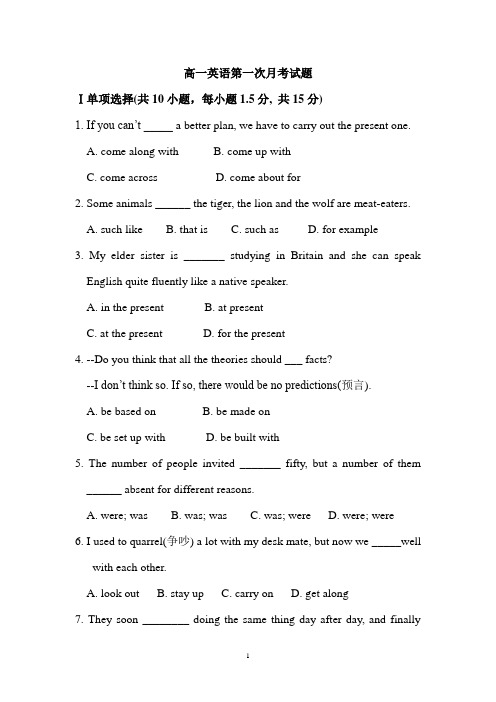
高一英语第一次月考试题Ⅰ单项选择(共10小题,每小题1.5分, 共15分)1. If you can’t _____ a better plan, we have to carry out the present one.A. come along withB. come up withC. come acrossD. come about for2. Some animals ______ the tiger, the lion and the wolf are meat-eaters.A. such likeB. that isC. such asD. for example3. My elder sister is _______ studying in Britain and she can speak English quite fluently like a native speaker.A. in the presentB. at presentC. at the presentD. for the present4. --Do you think that all the theories should ___ facts?--I don’t think so. If so, there would be no predictions(预言).A. be based onB. be made onC. be set up withD. be built with5. The number of people invited _______ fifty, but a number of them ______ absent for different reasons.A. were; wasB. was; wasC. was; wereD. were; were6. I used to quarrel(争吵) a lot with my desk mate, but now we _____wellwith each other.A. look outB. stay upC. carry onD. get along7. They soon ________ doing the same thing day after day, and finallygave up.A. got tired ofB. got along withC. got away fromD. get down to8. In order ______ a good driver, you have to learn from the experiencedones.A. becomingB. becameC. to becomingD. to become9. The money we made last year_____150million.A. added upB. added toC. added up toD. added10. They ______ each other for many years before they got married.A. had been in love withB. fell in love withC. had fell in loveD. loveⅡ.完形填空(共15小题;每小题2分,满分30分)One of my difficulties is to spell English. English words are too difficult _11__ spell correctly. I always need a__12__which I can carry by me when writing. When I think of a word that I am not sure I can spell, I look it__13__in the dictionary. But what__14__words I think I really can spell? Some of these words are the ones that I always spell wrongly! What I need__15__a book that contains(包含)all the words spelled__16__. Where can I find it? Properly I shall have to write myself!Of course, I need a book which I can rely on(依靠). If I can't rely on it,__17__is the use of it? Also, it must be a book to carry__18__,so it must be small__19__to put in my pocket.An Englishman__20__I knew to be a university lecturer once told me that even the most educated Englishman can’t _21___English word correctly! If he hears a new word which he has never heard before, he cannot be__22__how to spell it! I was so surprised ___23__ I wouldn't believe it, but he said,__24__,there are nearly half a million words in English, and nobody knows all of them, and secondly, English is not spelled phonetically(根据语音地). What he said__25_me very happy! If an English lecturer can not spell all English words correctly, how can I?11. A. for B. to C. on D. in12. A. book B. dictionary C.note D.pen13. A. down B. upon C.out D.up14. A. about B.of C.is D.are15. A. are B.be C.is D.being16. A. wrong B. correctly C.wrongly D.right.17. A. that B.when C.which D.what18. A. here B.there C. everywhere D.somewhere.19. A. big B.enough C.much D.so.20. A. who B.whose C.this D.which.21. A. spell B. read C.write D.hear22. A. say B.tell C.glad D.sure23. A. which B. that C. who D. and24. A. one B.beginning C.last D.firstly.25. A. made B.make C.do D.did.Ⅲ语法填空(共10小题,每小题1.5分, 共15分)阅读下面短文,根据上下文填入适当的词语,或使用括号中的词语的适当形式填空,并将答案填写到答题卷标号为16-25的相应位置。
人教版高中英语必修一第一学期高一级第一次月考试卷英语
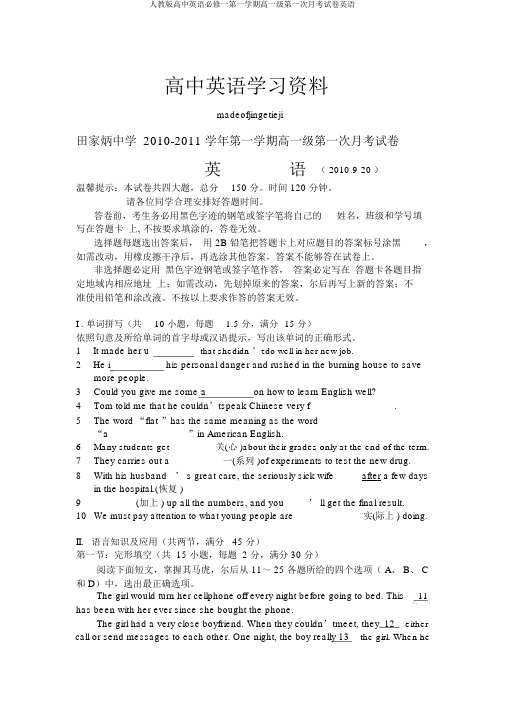
高中英语学习资料madeofjingetieji田家炳中学 2010-2011 学年第一学期高一级第一次月考试卷英语( 2010-9-20 )温馨提示:本试卷共四大题,总分150 分。
时间 120 分钟。
请各位同学合理安排好答题时间。
答卷前,考生务必用黑色字迹的钢笔或签字笔将自己的姓名,班级和学号填写在答题卡上, 不按要求填涂的,答卷无效。
选择题每题选出答案后,用 2B 铅笔把答题卡上对应题目的答案标号涂黑,如需改动,用橡皮擦干净后,再选涂其他答案,答案不能够答在试卷上。
非选择题必定用黑色字迹钢笔或签字笔作答,答案必定写在答题卡各题目指定地域内相应地址上;如需改动,先划掉原来的答案,尔后再写上新的答案;不准使用铅笔和涂改液。
不按以上要求作答的答案无效。
I . 单词拼写(共10 小题,每题 1.5 分,满分15 分)依照句意及所给单词的首字母或汉语提示,写出该单词的正确形式。
1 It made her u______ that shedidn ’t do well in her new job.2 He i_____ ___ his personal danger and rushed in the burning house to savemore people.3Could you give me some a___ _____ on how to learn English well?4Tom told me that he couldn’tspeak Chinese very f________________.5The word “flat ”has the same meaning as the word“a_______________”in American English.6Many students get ________ 关(心 )about their grades only at the end of the term. 7They carries out a _________ 一(系列 )of experiments to test the new drug.8With his husband ’ s great care, the seriously sick wife after a few days in the hospital.(恢复 )9________(加上 ) up all the numbers, and you’ ll get the final result.10We must pay attention to what young people are _____________实(际上 ) doing. II.语言知识及应用(共两节,满分 45 分)第一节:完形填空(共 15 小题,每题 2 分,满分 30 分)阅读下面短文,掌握其马虎,尔后从 11~ 25 各题所给的四个选项( A、 B、 C 和 D)中,选出最正确选项。
人教版高中英语必修一高一上学期第一次月考英语试题
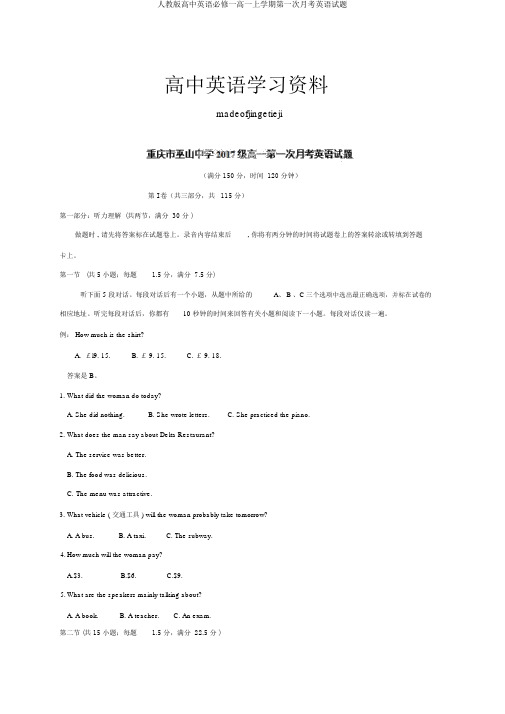
高中英语学习资料madeofjingetieji(满分 150 分,时间 120 分钟)第 I 卷(共三部分,共 115 分)第一部分:听力理解 (共两节,满分 30 分 )做题时 , 请先将答案标在试题卷上。
录音内容结束后, 你将有两分钟的时间将试题卷上的答案转涂或转填到答题卡上。
第一节(共 5 小题;每题 1.5 分,满分 7.5 分)听下面 5 段对话。
每段对话后有一个小题,从题中所给的A、 B 、C 三个选项中选出最正确选项,并标在试卷的相应地址。
听完每段对话后,你都有10 秒钟的时间来回答有关小题和阅读下一小题。
每段对话仅读一遍。
例: How much is the shirt?A. £l9. 15.B. £ 9. 15.C. £ 9. 18.答案是 B。
1. What did the woman do today?A. She did nothing.B. She wrote letters.C. She practiced the piano.2.What does the man say about Delta Restaurant?A.The service was better.B.The food was delicious.C.The menu was attractive.3.What vehicle ( 交通工具 ) will the woman probably take tomorrow?A. A bus.B. A taxi.C. The subway.4.How much will the woman pay?A.$3.B.$6.C.$9.5.What are the speakers mainly talking about?A. A book.B. A teacher.C. An exam.第二节 (共 15 小题;每题 1.5 分,满分 22.5 分 )听下面 5 段对话或独白。
人教版高中英语必修一高一英语月考试题

高一英语月考试题一.单项选择。
(共15题,每小题1分,共15分)1.As far as I am_________, I agree with what you said.A. concerningB. concernedC. facedD. known2. —So you didn’t say hello to him last night?—Well, I stopped and smiled when I saw him, but he ______me and walked on.A. ignoredB. refusedC. deniedD. missed3. You have to __________all the books before the exams.A. go throughB. go onC. go upD. go out4. John got up very early this morning ____ catch the first bus.A. So asB. In order thatC. in order toD. so that5. Tom’s illness _________ the family’s trouble.A. add upB. add up toC. add toD. are added to6. Don’t ______in the exam.A. calmB. cheatC. listD. ignore7. The teacher asked a difficult question, but finally Ted _____ a good answer.A. came up toB. came up withC. came over toD. came along with8. Holiday is coming. Students are busy _______ their things in the suitcase.A. pack upB. packing upC. packing offD. pack into9. ________ down what the expert will say at the meeting, will you?A. PutB. TurnC. ComeD. Set10. The _____ language used in most international organizations is English.A. officialB. nativeC. fluentD. separate11. He asked , “ Are you a Party member or a League member?”→He asked me _________.A. am I a Party member or a League memberB. was I a Party member or a League memberC. if I was a Party member or a League memberD. whether was I a Party member or a League member.12. It is so nice to hear from her, _______, we last met more than 30 years ago.A. what’s moreB. that’s to sayC. in other wordsD. believe it or not13. The general used his power, and _____ his men to fire at once.A. requestedB. askedC. conqueredD. commanded14. If you want to speak good English, a large _____ is needed.A. spellingB. vocabularyC. praticeD. memory15. As we all know, many Chinese words have come into English, ______ typhoon, tofu and kung fu.A. for exampleB. that isC. such asD. so as to二.完形填空(共20题,每小题1.5分,共30分)Water costs money.In some places water is hard 16 .What 17 when a townhas these problems?A small town in California found a happy 18 .Very 19 rain ever fell there.The town had no water 20 .The water it used was 21 from a river 300 miles away.As more people 22 live in the town 23 water was needed.Now water 24 to be brought in from 600 miles away.All these cost 25 money.The town 26 a plan.It found 27 to clean its “dirty” water.Once the cleaned water was reused 28 many ways.Five 29 lakes were built.Here people could swim and fish and go 30 .They 31 have picnics in their new parks.Farmers had more water 32 their crops.New factories can be built,now that they have the promise of 33 .In most places,water is used and thrown 34 .The town that saved 35 waterhas saved the town!16.A.supplying B.getting C.to get D.to supply17.A.happens B.happening C is happened D.happened18.A.key B.answer C answering D.way19.A.little B.a little C.few D.a few20.A.of itself B.of its own C.for its own D for itself21.A.fetch B.take C.brought in D.guided22.A.come to B.came to C.coming to D.came for23.A.many B.plenty of C.more D.many more24.A.has B.had C.must D.needed25.A.many B.a few C.a great many D.a lot of26.A.put B.made C.supply D.noticed27.A.a way B.ways C.an answer D.a key28.A.for B.by C.at D.in29.A.man-making B.man-make C.man-made D.man made30.A.boating B.to boat C.to boating D.on boating31.A.must B.could C.needed D.had to32.A.as B.with C.for D.to33.A.water enough B.enough water C. crops enough D.enough crops 34.A.off B.of C.away D.out of35.A.it’s B.its C.one’s D.his三.阅读理解(共20小题;每小题2分,满分40分)阅读下列短文,从每题所给的四个选项(A、B、C和D)中,选出最佳选项。
高一英语第一次月考试卷(有答案)
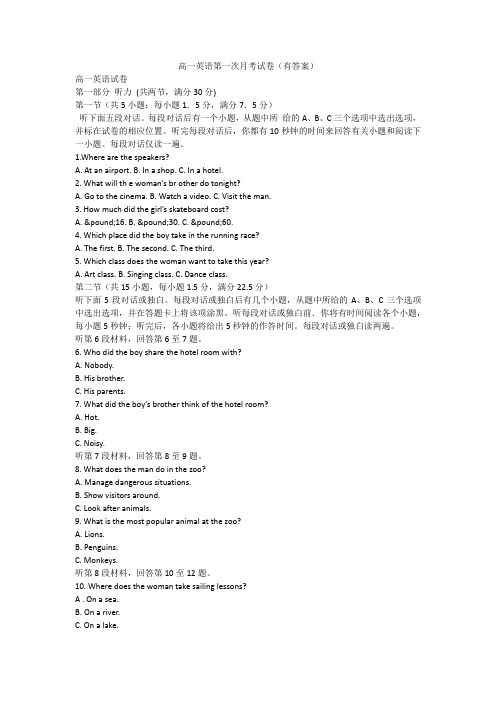
高一英语第一次月考试卷(有答案)高一英语试卷第一部分听力(共两节,满分30分)第一节(共5小题;每小题1.5分,满分7.5分)听下面五段对话。
每段对话后有一个小题,从题中所给的A、B、C三个选项中选出选项,并标在试卷的相应位置。
听完每段对话后,你都有10秒钟的时间来回答有关小题和阅读下一小题。
每段对话仅读一遍。
1.Where are the speakers?A. At an airport.B. In a shop.C. In a hotel.2. What will th e woman’s br other do tonight?A. Go to the cinema.B. Watch a video.C. Visit the man.3. How much did the girl’s skateboard cost?A. £16.B. £30.C. £60.4. Which place did the boy take in the running race?A. The first.B. The second.C. The third.5. Which class does the woman want to take this year?A. Art class.B. Singing class.C. Dance class.第二节(共15小题,每小题1.5分,满分22.5分)听下面5段对话或独白。
每段对话或独白后有几个小题,从题中所给的A、B、C三个选项中选出选项,并在答题卡上将该项涂黑。
听每段对话或独白前.你将有时间阅读各个小题,每小题5秒钟;听完后,各小题将给出5秒钟的作答时间。
每段对话或独白读两遍。
听第6段材料,回答第6至7题。
6. Who did the boy share the hotel room with?A. Nobody.B. His brother.C. His parents.7. What did the boy’s brother think of the hotel room?A. Hot.B. Big.C. Noisy.听第7段材料,回答第8至9题。
人教版高中英语必修一第一月月考参考答案
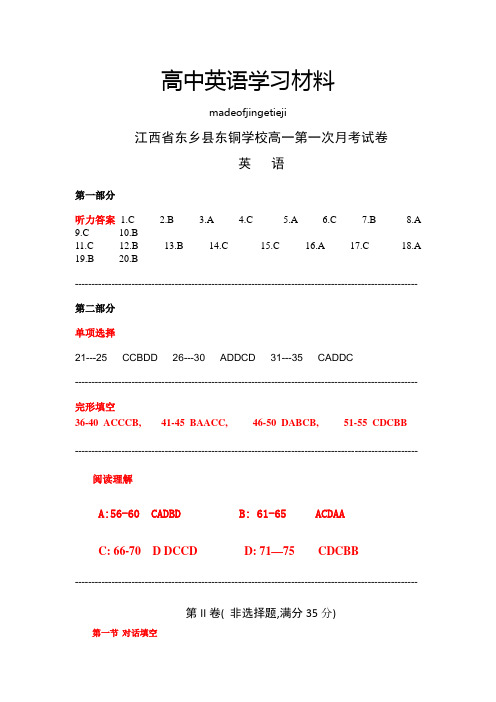
高中英语学习材料madeofjingetieji江西省东乡县东铜学校高一第一次月考试卷英语第一部分听力答案 1.C 2.B 3.A 4.C 5.A 6.C 7.B 8.A 9.C 10.B11.C 12.B 13.B 14.C 15.C 16.A 17.C 18.A 19.B 20.B------------------------------------------------------------------------------------------------------- 第二部分单项选择21---25 CCBDD 26---30 ADDCD 31---35 CADDC-------------------------------------------------------------------------------------------------------完形填空36-40 ACCCB, 41-45 BAACC, 46-50 DABCB, 51-55 CDCBB------------------------------------------------------------------------------------------------------- 阅读理解A:56-60 CADBD B: 61-65 ACDAAC: 66-70 D DCCD D: 71—75 CDCBB-------------------------------------------------------------------------------------------------------第II卷( 非选择题,满分35分)第一节对话填空76 :join 77:because 78:come 79:Excuse 80:present81:straight 82:such 83:end 84 in 85:enjoy 作文参考:Tom is quite a modest boy, though he is excellent in many ways. He never shows off. He does not look down on other students, instead, he tries his best to help his classmates when they have trouble. He always shares his opinions with others. He is quite easy-going. He gets on well with his classmates. Everybody wants to make friends with himTom is also an able and brave boy. He is never afraid of difficulties. He often speaks in assembly. And when he speaks, he always wins the most applause.听力原文件第一节1.W: What do you think we need to buy for our new kitchen?M: We've got a fridge and a dinner table already, we needs some chairs.2.M: I like to stay two nights, please.W: Do you want full board or half board?M: What's the difference?W: Full board includes all meals and half board includes just breakfast and dinner.3.M: Shouldn't we invite Cathy to the party tonight?W: Invite Cathy? She is the one who is complaining whole thing.4.M: Did you say you were driving to town this morning?W: Yes, I have to draw some money from the bank to pay my bookstore bills.5.M: What are you working on so hard?W: An article for the newspaper, if I am late, it won't get printed until next week.第二节6-7M: Excuse me, I think you are in my seat.W: Sorry, but it says 7A on my boarding card.M: Oh, uh, right, I asked for window seat, you see.W: yes, so did I, what's your seat number?M: Let's see, oh, it's 8A.W: Yes, I guess you are in the seat behind me.M : Oh, yes, sorry about that.8-9M: Can I help you?W: Yes, how mush are these T-shirts?M: They are 12 dollars 50 cents each.W: I like the green one, but it isn't big enough. Have you got larger size?M: Just a minute. No, I am sorry, we haven't. What about the black one?W: No, it is too dark, I prefer something lighter, yellow or pink?M: How about the pink one?W: That's nice, I will take it.M: That's 12 dollars 50cents then.W: Here you are.10-12W: So how long have you been living in London?M: A couple of years. How long have you been working here?W: Only a few months. I moved down here for the job. There is no work for me where I came from.M: Where did you come from then?W: I came from a small village called Arnside near Lancaster a year ago. There is nothing to do there, so I moved to London.M: Do you enjoying working here in this restaurant?W: Very much so.13-16M: I am sure you've noticed a lot of things that are different about our school.W: Oh, yes, in the United States, we don't have to carry a big school bag with us like you do.M: Why is that?W: We have a locker of our own which is a small box with a lock within textbooks and our personal things in it. I just bring a day pack to school.M: A day pack?W: Yes, it is a small bag which you carry on your back.M: What do you carry in it?W: My notebooks, or a few books for homework.M: That's convenient. Is there anything else you've noticed about our school?W: Yes, I am surprised that everyone is so silent in class.M: What do you mean?W: Well, we usually ask questions about exams, homework or textbooks on the first day of the school year. The teachers like such questions.M: So you thought it different.W: Yes, I expected to see a lot of discussions in class, because we learned that way in the United States.M: I see, that would be a good topic for our school newspaper for the fist month of the term. Nice talking with you. See you around. Bye.W: Bye.17-20W: Good morning, everybody. Today for our writing class, we are glad to have Mr. Henry Stone with us. A well know writer in this country, he is going to share with us his writing experiences. Now, Henry, please tell us how you find so many interesting things for your stories.M: Ok, I watch people a lot, I do that when I travel, I have been to many countries such as Britain, Italy, and Sweden. So I spent a lot of time at the airports, while waiting for my flights, I watch people passing by and start my imagination. For example, the other day when I was waiting for my flight to Greece, I saw a couple, they were buying magazines at that moment, they were not wearing business clothes, but the man was carrying a suitcase, every few seconds, the women looked around, I wondered someone was following them. Perhaps they were running away and, you know, this reminded me of a story in the newspaper that day: a banker stole one million ponds a weekbefore and disappeared with his wife, there was a picture of them in the paper, the couple really looked like the thieves, maybe I should stop them. Just then, I saw them say goodbye to each other. And the women walked away. Well, sometimes I make mistakes like that, but I find things like that very useful for my writing。
- 1、下载文档前请自行甄别文档内容的完整性,平台不提供额外的编辑、内容补充、找答案等附加服务。
- 2、"仅部分预览"的文档,不可在线预览部分如存在完整性等问题,可反馈申请退款(可完整预览的文档不适用该条件!)。
- 3、如文档侵犯您的权益,请联系客服反馈,我们会尽快为您处理(人工客服工作时间:9:00-18:30)。
翰林学校2017-2018第一学年高一英语第一次月考试题(共四大题,满分100分,考试时间120分钟)一.单项填空从A、B、C、D四个选项中,选出可以填入空白处的最佳选项。
(每题1分,共15分)( )1. The sea was _______ at the beginning of our voyage. But after a while a storm was coming.A. quietB. calmC. silentD. still( )2. Tom is able to lift the heavy box to the truck. He is full of _______.A. strengthB. forceC. energyD. power( )3. She soon _______ herself and stopped crying.A. got backB. renewedC. foundD. recovered( )4. These countries have _______ too many wars.A. got throughB. gone throughC. looked throughD. run through( )5. He asked us _______ we saw the lost cat or not.A. thatB. whatC. whichD. whether( )6. They hurried into the room to see _______ with their baby.A. what the matter wasB. what was the matterC. what matter it wasD. what matter was it( )7. I’m sorry to have broken your glasses. I mean I didn’t do it _______.A. for pleasureB. on purposeC. in returnD. indeed( )8. The soldiers saved a lot of people in that area. The people there are very _______ to them. A. thank B. happy C. grateful D. grate( )9. Tom is playing hide-and-seek. Do you know his _______ place?A. hiddenB. hideC. hidingD. hid( )10. The students in my class _______ fifty-four.A. add up toB. add toC. add upD. add in( )11. The Titanic sank on its first _______, and a great many people lost their lives.A. travelB. voyageC. tripD. journey( )12. I’ll come _______ to the point —your work isn’t good enough.A. straightlyB. rightC. straightD. direct( )13. The students _______ busily when the teacher went to get a book she _______ in the office.A. had written; has leftB. were writing; has leftC. had written; had leftD. were writing; had left( )14. — How long _______ in our city?—For just a few days. I’ll be back home next week.A. have you stayedB. do you stayC. did you stayD. are you staying( )15. Of all my English teachers, _______ has been to Australia.A. noneB. no oneC. eachD. neither二.完形填空阅读下面短文,掌握其大意,然后从各题所给的四个选项(A、B、C和D)中,选出最佳选项。
(每题1分,共15分)Hello. This is as good a way as any to welcome you to this passage.The word “hello” is 16 used more often than any other one in the English language. Everybody in the United States and elsewhere 17 the word, again and again, every day of the week.The first thing you hear when you 18 the phone is “hello”.Where did the word come from? There are all sorts of beliefs. Some say it came from the French, “ho” and “la”—“Ho, there!” This 19 may have arrived in England during the year 1066.“Ho, there” slowly became20 that sounded like “hallow”, often heard in the 1300’s.Two hundred years later, “hallow” had become “halloo”. And later, sounds like “halloa”and “hallo”were often used by sailors and huntsmen, “Halloo” is 21 used today by fox hunters.As time 22 , “halloo” and “halloa” changed into “hullo”. And during the 1800’s this was how people greeted each other in America.The American inventor, Thomas Edison, is believed to be the 23 person to use “hello” in the late 1800’s, soon after the invention of the telephone.At first, people had greeted each other on the telephone 24 “Are you there?” They were not sure the new instrument could really 25 voices.Thomas Edison, however, was a man of 26 words. He wasted no time. The first time he picked up the phone he did not ask if anyone was there. He was 27 someone was, and simply said, “Hello”.From that time on —only about 100 years ago, the “hullo” became “hello” as it is heard today.Of course, there are other 28 Americans greet one another. Not long ago, people often said, “How are you?” when they first met someone. This later became “hiyah”. Then, someone thoughtt hat two syllables were too much and “hiyah” became “hi”. Laziness is a strong force in 29 language.Answering a telephone call in America still presents problems; however, telephone companies think that Thomas Edison’s short “hello” is too long. Why w aste time? The phone companies say. Simply pick up the phone, 30 your name, and start talking.( ) 16. A. possibly B. maybe C. probably D. likely( ) 17. A. uses B. speaks C. writes D. hears( ) 18. A. take up B. pick up C. hold up D. put up( ) 19. A. word B. phrase C. letter D. greeting( ) 20. A. anything B. everything C. something D. nothing( ) 21. A. also B. too C. as well D. still( ) 22. A. passed B. passed by C. went D. past( ) 23. A. first B. last C. clever D. happy( )24. A. in B. with C. through D. by( ) 25. A. take B. bring C. carry D. fetch( ) 26. A. few B. a few C. little D. a little( ) 27. A. sure B. anxious C. glad D. nervous( ) 28. A. means B. ways C. methods D. ideas( ) 29. A. changing B. making C. fixing D. having( ) 30. A. tell B. say C. speak D. give三. 阅读理解(共20小题;每小题2分,满分40分)阅读下列短文,从每题所给的四个选项(A、B、C和D)中,选出最佳选项。
